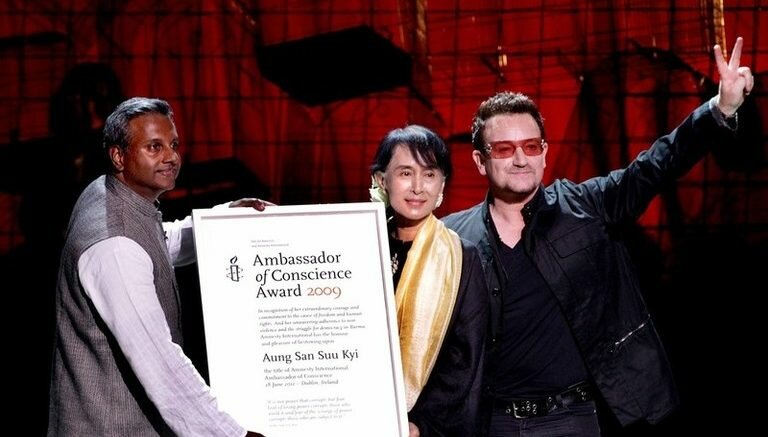Amnesty withdraws award to Suu Kyi
Myanmar’s political leader, and winner of the Nobel Peace Prize, Aung San Suu Kyi, is deprived of the honorary award she received from Amnesty International in 2009.
The pertinent prize is the Ambassador of Conscience Award, which is Amnesty’s most prestigious human rights award
The justification from Amnesty International states that: «Aung San Suu Kyi is no longer a symbol of hope, courage and struggle for international human rights».
Furthermore, her lack of effort to stop the persecution of the Rohingya Muslims in Myanmar’s northernmost state, Rakhine, is highlighted.
Since August 2017, the military forces of Myanmar (AKA Burma) have led an offensive against alleged separatist groups among the Muslim minority. The offensive has allegedly cost thousands of lives and driven 700,000 over the border to neighbouring Bangladesh, where they – according to Myanmar – belong.
In a recent report, the United Nations recommended that the regime’s military leadership must stand trial for genocide and persecution of the Rohingya. There is still a division of power between the military and civil leadership after the military junta stepped down.
Freedom of the press
In addition to the persecution of the Rohingya, the authorities are accused of pursuing journalists and limiting the freedom of expression of the press. As an example, The Burmese journalists Wa Lone and Kyaw Soe Oo from the Reuters news agency were sentenced to seven years in prison for possessing state secrets in September.
The journalists were investigating the persecution of the Rohingya when they were arrested last year.
The trial is seen as an attempt to gag the press, and the harsh sentences triggered protests from across the world.
Suu Kyi was for decades spearheading the non-violent opposition to the military junta in Burma, and from 1989 to 2010 she was detained in house arrest. That made her an international icon for human rights.
At the election in 2012 her party won, and since 2016 she has been the country’s Civil Leader in all but name. Suu Kyi is barred from the Presidency by the tailor-made constitution because her children are foreign nationals.
Backdrop
The Rohingya are a Muslim minority in the largely Buddhist country. They originate from Bangladesh but have lived several generations in Burma. Religious and cultural differences have led to increased tension, not in the least based on the fact that they are growing in numbers.
For more information on the conflict, see Wikipedia.
© NTB scanpix / #Norway Today




The problem is that The Rohingya claim they are native (something they are not) and they want liberation from Burma to form their own national state. It does not matter if they have lived there for several generations. It is like Norway should give away Nordland to form a new Muslim state since Muslims have lived there a few generations. Unfortunately the political left has lost all touch with reality and can only see through they’re postmodern victim lenses where the Muslim = victim regardless